
|
|
Packed house hears
pros and cons on Issue 2
By Bob Robinson
Editor
GREENVILLE – A packed house of approximately 150 people listened to
opening comments from a panel of six debaters Wednesday evening at the
American Legion in Greenville, then turned in their written questions.
The debate was sponsored by the Darke County League of Women Voters.
The topic of the debate? The controversial Issue 2, which has been
placed on the November ballot to determine the fate of Senate Bill 5,
passed by the Ohio Legislature and signed into law by Gov. John Kasich
last spring.
A “Yes” on Issue 2 affirms the Senate Bill 5 legislation. A “No” vote
on Issue 2 nullifies the legislation.
A “Yes” vote, according to the “Con” side, will effectively curtail,
even eliminate, the rights of government employees. It is viewed as an
attack on public service unions.
A “No” vote, according to the “Pro” side, will mean more lost jobs,
impacting education and public safety through layoffs. It is promoted
as an attempt to help local governments bring budgets under control.
On the “Con” side were Steve Lazarus, a Cincinnati attorney serving
public safety unions, Jim Surber, Darke County Engineer and Chairman of
the Darke County Democratic Party, and Robert Rhoades, retired
Greenville City firefighter.
On the “Pro” side were Justin Barnhart, a Republican political
consultant from Putnam County, State Rep. Jim Buchy (R-77), and Kelly
Kohls, School Board member, Springfield.
While questions typically got responses from as few as two or as many
as all six, in the interest of brevity and minimal confusion, opening
statements will be summarized and identified, while pros and cons to
questions will be simply noted as that: Pro or Con.
Lazarus (con). History is important in this issue. Prior to 1984,
strikes were illegal, but they were still happening illegally. Four
Cincinnati cops were killed in one year. They asked for bullet-proof
vests and higher powered ammunition. Multiple requests were greeted
with “no.” One day all of the cops parked their vehicles around City
Hall, turned on the lights and sirens, locked the cars and walked away.
This led to the Collective Bargaining Law in 1983. Binding arbitration
by a neutral third party. Twenty cases in all those years… management
got 10, unions got 10. Under SB5 (Issue 2), management makes the final
decision, so there would be no reason to negotiate.
Surber (con). If you are confused, you must be an objective, rational
voter. It is hard to follow, and there some good points to it. However,
a “Yes” will only antagonize those who serve, while a “No” preserves
the status quo. It must be fixed. If a “Yes,” there will be no reason
to fix it. If a “No,” there will be a reason to negotiate and fix it.
Rhoades (con). I’ve been called a “slug” because of my public service.
Not sure what that means, but there are firefighters in this room… and
they are not slugs. This only tells me there is too much
misunderstanding in the public. There are problems in state government;
not even one-tenth have to do with employees. When you have to train a
new boss every four years you will have problems.
Kohls (pro). When levies in my district failed the second time, school
buses were taken away, we had pay-to-play, they took textbooks and
more… students were falling behind. While on the board, I discovered
that the School Board only had control of 15 percent of its budget. The
other 85 percent had to be negotiated with the union. That turned out
to be not so easy. Many decisions came from Columbus making demands
with no idea of the cost. At the same time, I noted that administrator
and employee benefits equaled most of the things lost to the kids.
Children were being sacrificed to the old standards.
Buchy (pro). The Collective Bargaining Law was passed in 1983. The
legislature also passed a 90 percent (permanent) income tax increase to
pay for it. In the last 28 years, spending has exceeded the inflation
rate. Last year we ran out of money. It should be noted that in 1983
Ohio had 21 representatives in Congress. This year we had to redistrict
for 16. We have lost 600 thousand jobs. Senate Bill 5 is only one part
of a five-part plan. We have cut agencies across the board. This
legislation helps local districts control their budgets. A “Yes” vote
means jobs. A “No” vote means more layoffs.
Barnhart (pro). My generation needs Issue 2 to get jobs here. My
parents don’t want Issue 2, but my brothers and sister can’t live and
work in the same place because there are no jobs. My wife is a teacher.
She will vote yes. It’s not about the “good old boy” system; it’s about
why hard working people can’t get jobs. It isn’t just on unions, it’s
on all public employees.
Q: Do you think part-time councilmen and school board members should
have total power on people who work daily at their jobs? Pro: They are
elected by taxpayers. You have to trust those you elect to do their
jobs. Con: This deserves consideration. Before, they only had part of
the power. With this, they would have ultimate authority.
Q: Do you think there might be unintended consequences with merit
raises? Pro: Measuring performance should not be an issue. Miami
University is a top school. It has no unions. Con: Merit pay already
exists with local firefighters. It’s a six-step process. Con: Should
politicians decide what is involved in merit pay? Pro: There are 20
different items you can measure. Labor (peers) would be involved in the
process.
Q: Legislators and aides haven’t taken cuts. Pro: It’s in the
Constitution… we can’t change pay scales in the middle of a legislative
session. Con: All of us should be making sacrifices. Change should
occur from top to bottom, not bottom to top. Pro: If Columbus is doing
something wrong, tell them. This is about our communities. I take 10
percent of my gross salary (7 percent of net) once a month and write a
check to the State of Ohio (Buchy).
Con: Reiterated, defeat Issue 2 then send it back to the Legislature to
get fixed. Pro: We don’t have time. If it is defeated we will have jobs
lost. Con: Corning is closed, plant is gone. This was not the union’s
fault.
Pro: West Central Ohio is ahead of the curve because of our
conservative values. The problems are in Cleveland and other areas.
Think “Ohio.” You don’t think this is a problem? Why have we lost five
representatives in the last 28 years?
Q: Was organized labor brought to the negotiating table? Pro: Yes. The
police and firefighters negotiated. That’s why they got negotiating
rights on safety equipment. The other unions didn’t. Con: When were
they asked? Pro: The day the legislation was introduced.
Summary… Con from Rhoades: The Republicans want it. The Democrats
don’t. Jim (Surber) is a Democrat and management. I’m a Republican and
labor. The bill is wrong. Con: There is nothing to require management
to negotiate. It’s meaningless. Pro from Buchy: Everybody always
understands when there is less money. You work with what you have.
Passions were notably high throughout the 2-hour debate. One person
stood up demanding his First Amendment right to speak. He was refused,
noting that he can write his question on a piece of paper like everyone
else. He then referred to one of the participants as a liar and left.
On two occasions, the room broke out in laughter over a question and
its response. On another occasion profanity was used.
Moderator Eileen Litchfield maintained the civility of the evening
without further issues.
|
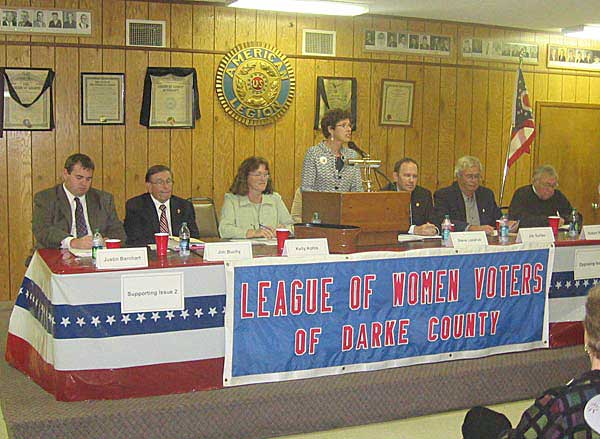
|
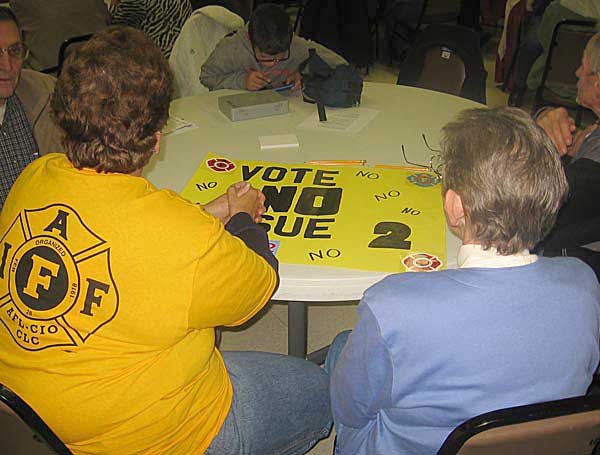
|
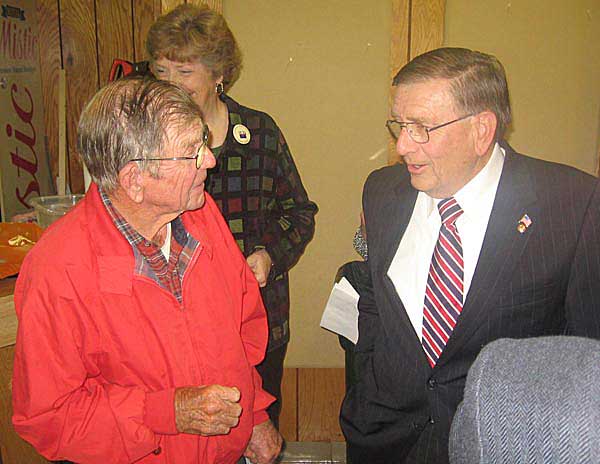
|
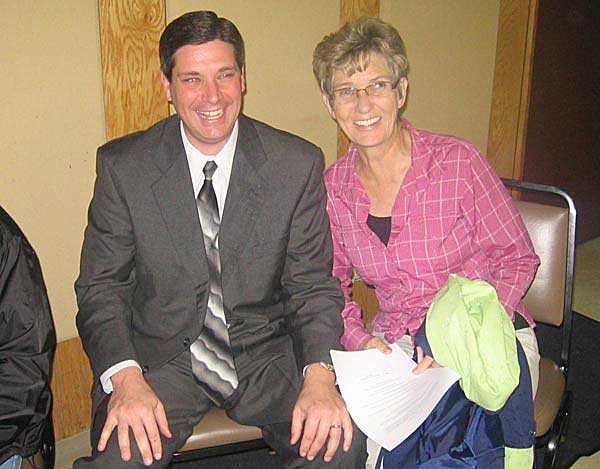
|
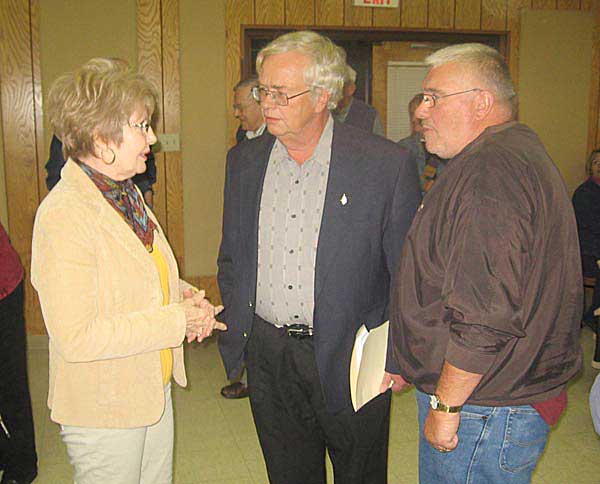
|
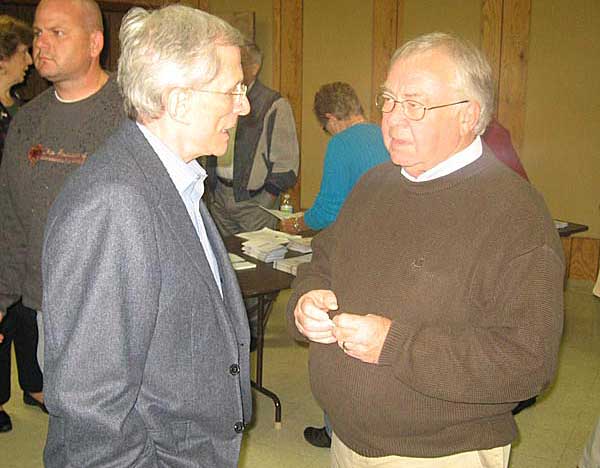
|
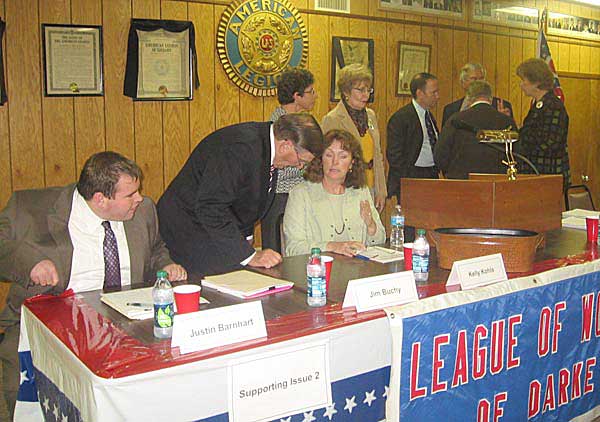
|
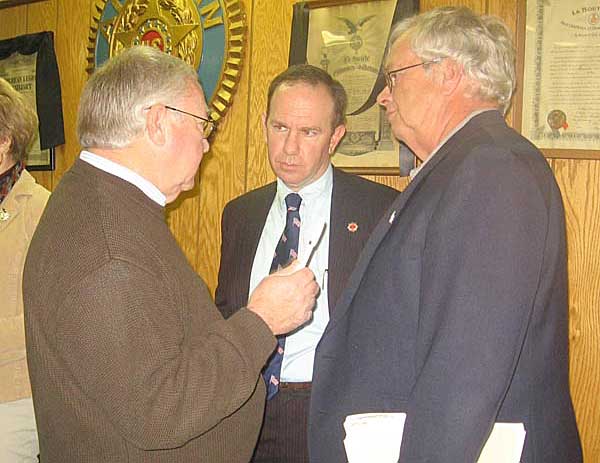
|
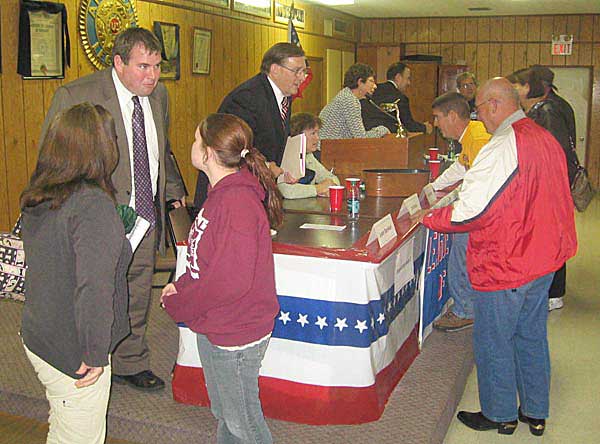
|
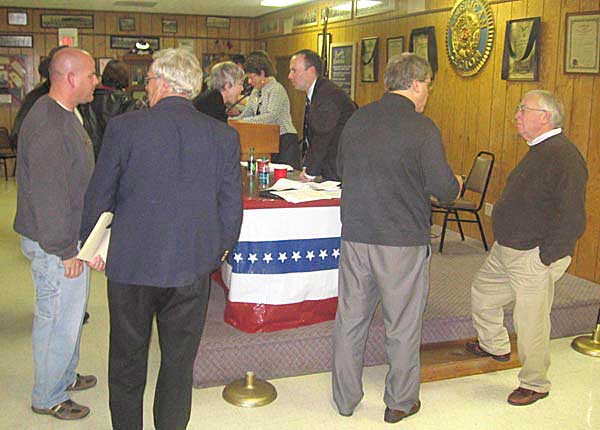
|
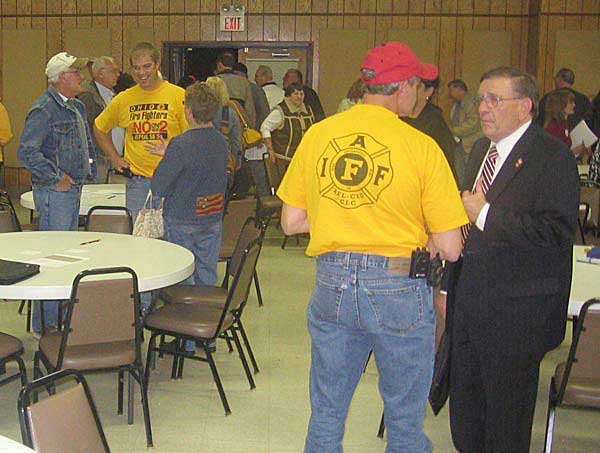
|
|
|
|

